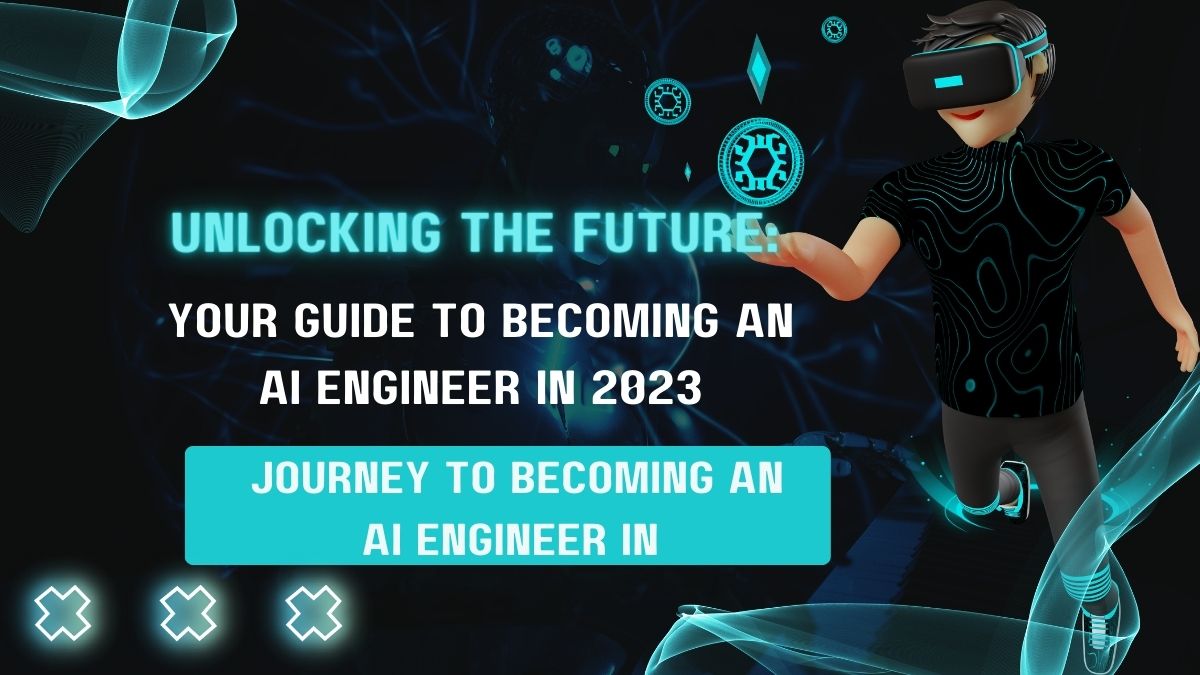Unlocking the Future: Your Guide to Becoming an AI Engineer in 2023
Charting Your Future: Your Journey to Becoming an AI Engineer in 2023
In the ever-evolving landscape of technology, AI engineers are in high demand, and this demand is poised to continue its upward trajectory. The attraction of artificial intelligence lies in its boundless potential to revolutionize and streamline a wide array of tasks traditionally performed by humans.
From speech recognition and image processing to business process optimization and even disease diagnosis, AI’s reach is limitless. If you possess a strong technical inclination and a background in software programming, starting a rewarding career and becoming an AI engineer in 2023 is a path worth exploring.
Understanding Artificial Intelligence
Artificial Intelligence (AI) refers to the capacity of computer systems to emulate human behavior. Machines, in this context, exhibit a form of intelligence akin to the natural intelligence demonstrated by humans and animals. In the realm of AI, machines learn from past data and actions, both positive and negative. Armed with this newfound knowledge, machines can rectify their shortcomings, adapt to new inputs, and perform tasks with human-like competence.
What Does an AI Engineer Do?
AI engineers are tasked with constructing AI models employing machine learning algorithms and deep learning neural networks. These models are instrumental in deriving valuable business insights, which, in turn, help critical organizational decisions. Depending on their objectives, AI engineers can build weak or strong AI systems. These professionals possess a solid grounding in programming, software engineering, and data science, utilizing a diverse set of tools and techniques to process data and develop and maintain AI systems.
AI developers produce a wide range of AI applications, including sentiment-based contextual advertising, visual identification or perception, and language translation. The next section goes into the duties of an AI engineer.
How to Become an Artificial Intelligence Engineer
Consider the following steps to map your path to artificial intelligence expertise:
Step 1. Obtain a Secondary School Diploma
Your journey begins with the attainment of a high school diploma, ideally with a specialization in a scientific discipline such as chemistry, physics, or mathematics. A foundation in statistics can also prove invaluable. A robust grounding in scientific subjects at the high school level sets the stage for your future learning.
Step 2. Complete a Bachelor’s Degree
You have the option to enroll in a three-year Bachelor of Science (B.Sc.) program or a four-year Bachelor of Technology (B.Tech.) program. Alternatively, you can pursue an engineering degree in a closely related field, such as information technology or computer science, and subsequently specialize in artificial intelligence, complemented by data science and machine learning. Attaining admission to prestigious engineering institutions like NITs, IITs, and IIITs may necessitate strong performance in the Joint Entrance Examination (JEE).
Step 3. Pursue a Master’s Degree
Enhance your competitive edge in the AI engineering arena and bolster your earning potential by considering a Master’s degree in Artificial Intelligence Engineering or a related discipline. This advanced degree equips you with comprehensive knowledge and specialized technical prowess.
Step 4. Earn Certifications
Exploring Artificial Intelligence Courses or diploma programs can enhance your skill set without a substantial financial investment. Graduate and post-graduate degrees dedicated to artificial intelligence and machine learning are also viable options.
Step 5. Acquire Practical Experience
For prospective AI engineers, practical experience is essential. While a strong foundation in mathematics, statistics, and computer science is essential, hands-on experience with real-world problems is also essential. Participating in projects and hackathons allows for the development of practical skills as well as knowledge of the tools and technologies used in the AI area.
Online courses and boot camps, when combined with organised learning and mentorship, enable participants to participate in real-world projects and receive feedback from industry professionals. You may become a competent AI engineer and contribute significantly to the developing domain of artificial intelligence by combining academic knowledge with practical expertise.
For More info – Book Appointment with EXPERT
Artificial Intelligence Qualification/Education
Although AI engineering is still in its infancy, it shows significant potential in terms of future career opportunities. A bachelor’s degree in a related discipline, such as information technology, computer engineering, statistics, or data science, is required to enter the field of AI engineering.
Obtaining a master’s degree in artificial intelligence after receiving a bachelor’s degree in computer science might help you advance your career, especially if you specialize in data science, deep learning, or machine learning. This broad knowledge foundation positions you to find work and obtain a thorough understanding of essential subjects.
Suggested Read- Don’t Be Fooled! Debunking the Top 7 Programming Myths
Responsibilities of an AI Engineer-
AI and machine learning engineers are responsible for various critical tasks:
- Development, testing, and deployment of AI models through programming algorithms, including random forest, logistic regression, and linear regression.
- Transformation of machine learning models into application program interfaces (APIs) to enable their use by other applications.
- Creation of AI models from scratch and explanation of their outputs to various organisational components such as product managers and stakeholders.
- Establishment of data ingestion and data transformation infrastructure.
- Automation of the infrastructure utilized by the data science team.
- Execution of statistical analysis and fine-tuning of results to facilitate well-informed organizational decision-making.
- Setup and management of AI development and product infrastructure.
- Commitment to effective teamwork, as collaboration with colleagues, is imperative.
Skills Required to Become an AI Engineer
Professionals aspiring to embark on a career as an AI engineer should cultivate a range of skills, including:

1. Technical Skills
Programming Skills: Mastery of programming languages like Python, R, Java, and C++ is foundational for AI engineers. These languages empower engineers to construct and implement AI models.
Linear Algebra, Probability, and Statistics: A profound understanding of linear algebra, probability, and statistics is essential for comprehending and implementing various AI models and algorithms.
Spark and Big Data Technologies: AI engineers often work with massive datasets, necessitating familiarity with Spark and other big data technologies like Hadoop, Cassandra, and MongoDB.
Algorithms and Frameworks: Proficiency in machine learning algorithms such as linear regression, KNN, Naive Bayes, Support Vector Machine, and deep learning algorithms is indispensable. Familiarity with frameworks like PyTorch, Theano, TensorFlow, and Caffe is equally crucial.
2. People Skills
Communication Skills: Given the wide audience with whom AI developers work, effective communication is critical. It is critical to communicate complicated ideas in a clear and succinct manner.
Problem-solving Abilities: Addressing real-time difficulties requires AI developers to be innovative problem solvers.
Domain Expertise: Understanding the demands of the company and the specific challenges AI solutions aim to resolve is vital. A lack of domain expertise can result in inaccurate recommendations and incomplete work.
Time Management: Efficient time management is essential, considering the multifaceted demands AI engineers face, from research and project planning to software development and testing.
Teamwork: Collaboration is a hallmark of AI and IT communities. The ability to work effectively within both small and large teams is highly beneficial.
Business Intelligence: An understanding of how businesses operate, their target audiences and market dynamics is advantageous, regardless of the industry.
Critical Thinking Ability: AI engineers must swiftly evaluate facts to formulate sound conclusions, particularly when devising creative AI models and technology solutions.
AI Engineer Salary
According to Glassdoor, the average annual salary of an AI engineer is $114,121 in the United States and ₹7.5 Lakh in India. Salaries can vary across organizations, with higher compensation correlating to expertise and experience.
How to Build a Career in AI

In addition to learning how to become an AI engineer, you must decide which industry you want to work in. The global presence of AI in a variety of areas, including healthcare and education, opens up a plethora of professional prospects. Among the positions available in the AI field are:
- AI Developer: Collaborating with electrical engineers to develop software for intelligent robots.
- AI Architect: Providing constructive business and system integration services, along with overseeing architectural aspects.
- Machine Learning Engineer: Building predictive models using extensive datasets and a deep understanding of machine learning and deep learning.
- Data Scientists: Collecting, cleaning, analyzing, and interpreting complex datasets using machine learning and predictive analytics.
- Business Intelligence Developer: Designing,modelingg, and analyzing intricate data to uncover business and market trends.
In conclusion, the path to becoming an AI engineer in 2023 is rife with opportunities and potential for growth. By following these steps and honing the requisite skills, you can unlock a prosperous career in the dynamic and ever-evolving field of artificial intelligence.
Q 1 : What is Artificial Intelligence (AI)?
Artificial Intelligence (AI) refers to the ability of computer systems to emulate human behavior. Machines, in the context of AI, exhibit a form of intelligence akin to the natural intelligence demonstrated by humans and animals.
Q 2 : What do AI Engineers do?
AI engineers construct AI models using machine learning algorithms and deep learning neural networks to derive valuable business insights. These insights are instrumental in making critical organizational decisions.
Q 3 : How can I become an AI Engineer in 2023?
To become an AI engineer in 2023, follow these steps: – Obtain a high school diploma with a scientific specialization. – Pursue a Bachelor’s degree in a relevant field. – Consider obtaining a Master’s degree. – Earn certifications in AI. – Acquire practical experience through projects and hackathons.
Q 4 : What qualifications are needed to work in AI engineering?
A bachelor’s degree in fields like information technology, computer engineering, statistics, or data science is essential. A master’s degree in artificial intelligence can further enhance your qualifications.
Q 5 : What skills are required to become an AI Engineer?
Essential skills for AI engineers include proficiency in programming languages like Python and R, knowledge of linear algebra and statistics, familiarity with big data technologies, understanding of machine learning algorithms, and strong problem-solving abilities.
Q 6 : What is the average salary of an AI Engineer?
According to Glassdoor, the average annual salary of an AI engineer is $114,121 in the United States and ₹765,353 in India. However, salaries can vary based on experience and the organization.
Q7 : What roles are available in the field of AI?
Several roles are available in the AI field, including AI Developers who work with robots, AI Architects who provide system integration services, Machine Learning Engineers who build predictive models, Data Scientists who analyze complex datasets, and Business Intelligence Developers who identify market trends.









4 Comments